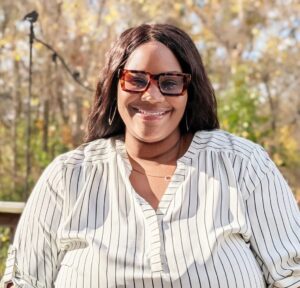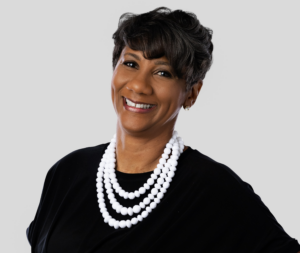Hasbro CCO Roberta Thomson on how comms pros shape the game and protect reputation
Roberta Thomson of Hasbro shares her most unexpected lesson in comms.

From her time singing in a rock band to making her mark in the world of communications, Roberta Thomson, executive vice president and chief communications officer of Hasbro, Inc., learned the power of storytelling and the flexibility it takes to succeed.
“I think just the ability to say yes and be flexible can be very powerful,” Thomson told Ragan. “And if you have too much of a rigid viewpoint about what your career path is going to be, then you actually might miss out on opportunities, and especially if you think about every job is changing, the workforce is changing.”
At Hasbro, Thomson is responsible for global internal and external communications, including corporate brand and reputation, product publicity, and issues management. The CCO provides a strategic narrative to bring Hasbro and its businesses alive, delivering powerful storytelling to stakeholders including fans and media.
In your journey from a rock band vocalist to a top communications leader, how have the storytelling skills from your musical background translated into crafting compelling brand narratives?
I was 15 in a band of mostly girls, and we were putting our heart and soul out there in a very male-dominated environment. I think was very formative for me, and understanding that my voice mattered and how I would need to speak up for myself. So I think that was very relevant to how you figure out your voice as a leader in an organization and build confidence over several years. Throughout my career, I’d say it has taken years to get to where I am now, which is confident in my voice and my point of view.
Another thing I think that has been formative to thinking about storytelling — I’m a classics major, which is a little bit of an unusual degree. I focused on Ancient Greek literature and philosophy, and when I went back to college, my old tutor was so delighted to hear that I was in public relations, because she said, “Well, you studied Cicero, the master of rhetoric. So it’s no surprise that you’re now telling stories.” If you think about the greatest kind of orators of all time who were involved in inventing democracy back in 500 BC, in Athens, and addressing everyone who could fit on a hill to run the ancient Greek democracy. Those skills and the speeches that you can still look at now and understand all the rhetorical tricks, that was another cool grounding for how to tell good stories that resonate over time.
With your background spanning finance, technology, and communications, what unique perspective do you bring to navigating complex corporate storytelling that others might miss?
Navigating storytelling. I think it is not that hard to craft a compelling story. You have to be fanatical about being clear, concise, and connecting with an audience. Having some kind of emotional response, just like any good brand marketer would tell you. I think the other piece of being successful in any organization is how you operate and understand the environment you’re in, how to collaborate with other people and understand the stakeholders you’re communicating with. And so from all of my years working in-house, I think my biggest learning is just the way that you do things, the way that you get there, and how you bring people along, is just as important sometimes as the end result. You could be a brilliant individual contributor, but If you can’t bring other people along, or if you don’t have your customers or your fans at the heart of what you’re doing, you’re not going to be successful.
What’s a counterintuitive lesson that you’ve learned about connecting with diverse audiences?
I say this as someone who’s a diverse audience myself — don’t assume. I hear so many assumptions about what people from underrepresented groups want or need. Just listen, talk to the folks or your intended audience and ask the question. This is negotiation 101. And then the step that everyone forgets is to ask them what they want. You can’t just sell them something without understanding what they need. So that would be my lesson, just don’t assume what people want to hear.
If you could create a mash-up between your rock band days and your current role at Hasbro, which toy or game would you turn into a musical sensation, and, what would be the hook?
This is a fun one because we have some great music as part of our canon at Hasbro. My favorite brand is Transformers. A Transformers theme tune is a banger. We just released a Dungeons and Dragons album, so there’s some amazing music to draw from that. Unicron is from the original Transformers movie back in the 80s. And Unicron is an eater of planets, so he’s the ultimate bad guy. So if I was gonna do a musical mash-up, let’s say that Unicron would make a pretty badass rapper.
If you could design a master class on communications resilience, what would be the most unexpected lesson that you’ve learned?
The most unexpected lesson in being a comms person: would be that often you’re not doing comms, you are moving forward an idea or a project. I think, as communicators, we sit at the center of a lot. We have a lot of information, visibility, and access, so that means we can do a couple of things. We can move an idea forward because we have the context, the experience, and the judgment to do so.
Also, we have an innate ability to spot issues before they percolate, and this is why I think it’s so important for comms to have a seat at the table in business and product decision-making because we are the stewards of the corporate reputation of the company or whatever kind of organization you work for, whether it’s a nonprofit or a hospital with a stewards of corporate reputation. We can advise at an early stage if there’s something that’s going to enhance our corporate reputation or something that may need us, ultimately, to protect our corporate reputation. And so I think comms as a function that really can sit at the table as part of that business strategy and product advisory is incredibly important.
What advice would you give to someone starting their career?
Be very open. There’s something that you might try and you think it’s going to be so cool and you’re gonna love it, and then you might not get as much energy from it as you think. So I think starting at an agency is a great way to build a career in communications. I thought it would be cool to work with a lot of retail clients. In the end, I ended up enjoying the work I did with more industrial clients. And I think just that openness to try a bunch of different things and see what gives you the most energy. Because at the end of the day, building a career that’s filled with work you enjoy, is all about identifying those skills that you get that give you energy when you use them at work. And remember what you’re good at, your strength isn’t always the same as what you enjoy. And if you can, build a portfolio of things that you enjoy, and you’re going to hit that sweet spot of having a job that you love.
Isis Simpson-Mersha is a conference producer/ reporter for Ragan. Follow her on LinkedIn.







